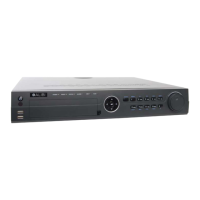
Do you have a question about the ALIBI ALI-NVR5000P Series and is the answer not in the manual?
Covers FCC compliance and related guidelines.
Details FCC compliance statements and conditions for the device.
Provides essential tips for safe operation and device care.
General safety guidance for installation and operation.
Describes the front panel and backpanel components and their functions.
Details functions of buttons on the IR remote control for NVR operation.
Explains how to use a USB mouse for NVR navigation and operations.
Describes the on-screen keyboards for data input within the NVR interface.
Lists items included in the system and required tools for installation.
Provides essential guidelines for proper NVR placement and environmental considerations.
Instructions for installing a Hard Disk Drive (HDD) into the NVR for storage.
Guidance on choosing a suitable location for the NVR to ensure optimal performance.
Details how to wire alarm inputs and outputs to the NVR system.
Step-by-step guide for connecting external alarm sensors to the NVR.
Instructions for connecting external devices to the NVR's alarm output terminals.
Covers the setup and connection of essential peripherals like monitors and mice.
Guides users through the initial connection of system components for setup.
Walks through the NVR's setup wizard for initial configuration.
Explains how to access the NVR's main menu interface for system management.
Details how to configure individual camera settings like OSD, image, and detection.
Describes how to configure On-Screen Display (OSD) settings for cameras.
Explains how to adjust image parameters such as brightness and contrast for cameras.
Covers configuration for cameras supporting Pan, Tilt, and Zoom (PTZ) functionality.
Guides on setting up motion detection parameters and actions for cameras.
Instructions for masking specific areas in camera video feeds for privacy.
Details how to configure settings for detecting video tampering incidents.
Explains how to set up alarms and responses for video loss detection.
Procedures for manually adding IP cameras to the NVR system.
Covers management and configuration of Hard Disk Drives (HDDs) for recording.
How to check the operational status of installed HDDs.
Guidance on adding and configuring network storage devices like NAS or IP SAN.
Setting up HDD modes like Partition or Group for recording allocation.
Procedures for testing HDD health via S.M.A.R.T. and Bad Sector Detection.
Setting up system-level alarms for events like HDD errors or network disconnections.
Configuring reactions to external alarm inputs wired to the NVR.
Covers the essential procedures for powering the NVR on, off, and restarting it.
Steps for correctly powering on the NVR unit.
Steps for correctly powering off the NVR unit.
Instructions on how to restart or reboot the NVR.
Explains how to view live video feeds from connected cameras.
Describes how to control live view using the NVR's front panel buttons.
Details mouse operations for navigating and controlling live view features.
How to utilize an auxiliary monitor for live view display.
Explains the meaning of icons displayed in the live view for status indicators.
Overview of the quick access toolbar for common live view functions.
Describes the context menu accessed by right-clicking in the live view.
Configuration options for customizing the live view display and behavior.
Feature to reduce bandwidth usage while viewing multiple channels remotely.
Steps to configure parameters for controlling PTZ-capable cameras.
How to set up camera presets, patrol routes, and movement patterns.
Guide to saving specific camera positions as presets for quick access.
How to recall saved camera presets to move the PTZ camera.
Setting up automated camera movements between predefined points (presets).
Instructions for activating preset patrol routes for PTZ cameras.
Recording and saving custom PTZ camera movement sequences.
Activating recorded movement patterns for PTZ cameras.
Accessing the interface for direct control of PTZ camera functions.
Settings for how the NVR records video, including parameters and schedules.
Configuring resolution, frame rate, and other video encoding settings per camera.
Setting up time-based schedules for automatic recording.
Setting up schedules for capturing still images from cameras.
Setting up recording triggered by motion detection events.
Initiating and stopping manual recording sessions.
Organizing HDDs into groups for specific recording assignments.
Locking recorded files to prevent overwriting or setting read-only properties.
Features for reviewing recorded video footage.
Quickly playing back the last few minutes of recorded video for a selected channel.
Detailed playback of recorded video for specific channels and dates.
Searching and playing back video based on specific time durations.
Searching playback records based on event types like alarms or motion.
Finding and replaying video clips using user-defined tags.
Efficient playback highlighting motion or VCA events with variable speed.
Reviewing recorded events by searching system log entries.
Playing video files stored on external USB devices.
Reviewing video footage frame by frame for detailed analysis.
Playing back recorded video from multiple channels in reverse.
Zooming into specific areas of the video feed during playback.
Procedures for exporting recorded video clips for backup.
Method for rapidly exporting video clips from selected channels.
Exporting video clips based on search criteria like time range.
Exporting video clips associated with specific events such as motion detection.
Saving segments of video directly during playback.
Steps to create new user accounts with specific permissions for system access.
Procedure for removing existing user accounts from the NVR.
Modifying existing user account details, permissions, and passwords.
Instructions for changing the password of the default administrator account.
Setting up fundamental network parameters like IP address and gateway.
Advanced network configurations for remote access and connectivity.
Setting up Dynamic DNS for remote access to the NVR.
Configuring the Network Time Protocol server for accurate time synchronization.
Setting up a remote host to receive alarm event notifications.
Enabling multicast functionality for efficient video streaming to multiple clients.
Setting up Real-Time Streaming Protocol for media streaming.
Adjusting server and HTTP ports for remote client and browser access.
Setting up email notifications for alarms and system events.
Enabling Universal Plug and Play for automatic network device discovery.
Displays status reports of the NVR, cameras, network, and HDDs.
Managing and exporting system logs for troubleshooting and auditing.
Searching system logs for specific events or information.
Exporting system log data to a backup device in .txt format.
Backing up and restoring NVR system configuration settings.
Instructions for updating the NVR's firmware.
Resetting the NVR to its factory default configuration settings.
Tools for monitoring and testing network performance and status.
Viewing real-time network traffic information and status.
Performing tests to identify network delay and packet loss issues.
Capturing and exporting network data packets for analysis.
Verifying the current network status and parameters.
Reviewing real-time network status including bandwidth usage.
Tools for checking HDD health via S.M.A.R.T. and Bad Sector Detection.
Setting up a hot spare system for enhanced data reliability.
Configuring the NVR to recognize and utilize a hot spare device.
Configuring the primary device that the hot spare will monitor.
Linking working devices to the hot spare for failover operation.
Cloning HDD data to an eSATA disk for backup or replacement.
Accessing the NVR interface from a remote computer over a network.
Viewing live camera feeds remotely through the web interface.
Remotely reviewing recorded video footage from the NVR.
Accessing and viewing NVR system logs remotely.
Remotely viewing and modifying NVR configuration settings.
Instructions for cleaning the NVR and camera components.
Technical details and features of the NVR models.
Definitions of technical terms used throughout the manual.
Frequently Asked Questions and their answers regarding NVR operation.
Information on recommended types of Hard Disk Drives for the NVR.
Step-by-step guide for physically installing HDDs into the NVR chassis.
List of IP cameras confirmed to be compatible with the NVR.

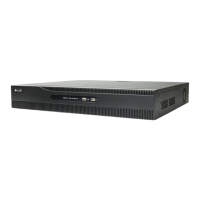
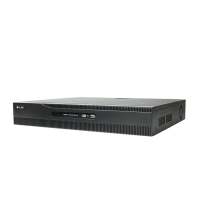
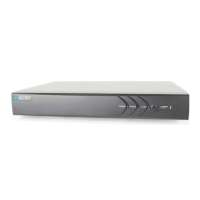
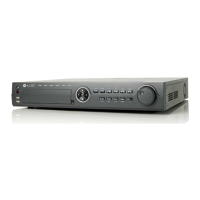


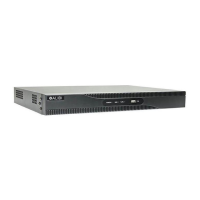


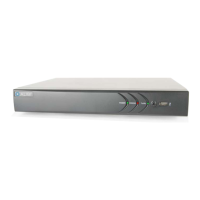
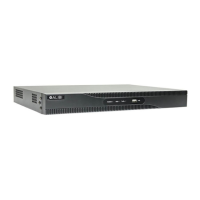
